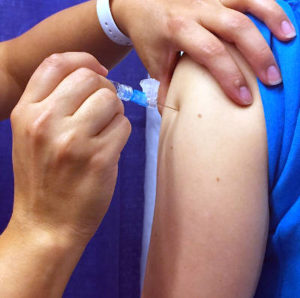
It’s still difficult for many eligible older adults in parts of the U.S. to get COVID-19 vaccination appointments. And that’s exactly what con artists are counting on.
The Centers for Medicare & Medicaid Services (CMS), the Federal Bureau of Investigation (FBI), and the Department of Health and Human Services Office of Inspector General (HHS-OIG) are warning the public — especially elders — about several fraud schemes related to COVID-19 vaccines.
Scammers are using the intense public interest in COVID-19 vaccines to obtain personally identifiable information and money through various rackets that include charging a fee for early access to a vaccine or supposedly adding a person’s name to a vaccine waiting list, according to a joint statement from the three agencies. Other identified schemes include offers also to undergo additional medical testing or get procedures when obtaining a vaccine. People are also reporting unsolicited emails, telephone calls and personal contact from someone claiming to be from a medical office, insurance company or a COVID-19 vaccine center, requesting personal and medical information to determine eligibility to participate in clinical vaccine trials or obtain the vaccine.
Additional common scams include:
- Claims of FDA approval for a vaccine or treatment that has not received clearance
- Unsolicited or unknown sources that are advertising vaccine availability through social media, email, or phone calls
- Calls or emails falsely claiming that the government (or certain government officials) require everyone to get a vaccine
This story in the Philadelphia Gay News looks at some of the most common frauds targeting older adults. Like those described in this Portland Press Herald story, scams are happening all over the U.S., in part because the tight vaccine supply availability means older people must continue to isolate themselves from family and friends.
As the number of people and communities affected by the COVID-19 pandemic grows, so do the scams associated with it. According to the Administration for Community Living, scammers often use public health emergencies as fraud opportunities.
“You think you’ve hit bottom with these scams, but there’s always another one,” Robert Blancato, national coordinator for the Elder Justice Coalition, said in a phone interview. When it comes to obtaining a COVID-19 vaccine, people want to believe it’s true, so they may more readily fall for a con, Blancato said.
“Seniors are also more vulnerable to these calls because so many live alone and are isolated. Scammers are good at building trust and they think they have a friend,” he added.
Not only are scammers managing to obtain credit card or bank information, but they can also steal medical information, enabling identity theft and Medicare fraud. Seniors need to question the person on the other end of the line before giving out any personal information. “Ask how the person found you, and only trust reliable sources for information,” Blancato said.
The $900 billion COVID relief legislation passed last December allocated $100 million to the Administration for Community Living to address abuse, neglect and exploitation of the elderly. Much of that money will go towards costs associated with scams and fraud, including increasing public awareness efforts by federal and state agencies.
The Senior Medicare Patrol (SMP), which assists Medicare beneficiaries, their families and caregivers in preventing, detecting, and reporting health care fraud, errors and abuse, recommends that older adults:
- Contact their doctor if experiencing potential symptoms of COVID-19.
- Never give out their Medicare number, Social Security number, or personal information in response to unsolicited calls, texts, emails, home visits, or booths at health fairs and other public venues.
- Be suspicious of anyone going door-to-door to offer free coronavirus or COVID-19 testing, supplies, treatments, or vaccines.
- Beware of providers offering other products, treatments or medicines to prevent the virus. It’s important to check with their health care provider before paying for or receiving any COVID-19-related treatment.
- If they get a call, text, email — or even someone knocking on their door — claiming they can get them early access to the vaccine, STOP. That’s a scam.
- Carefully review their Medicare Summary Notice (MSN) or Explanation of Benefits (EOB), looking for errors or claims for products or services not received.
- Follow the instructions of your state or local government for other actions they should be taking in response to COVID-19.
- Contact their local Senior Medicare Patrol for help.
SMP and other fraud experts also advise that consumers not share photos of their vaccination cards on social media — that cards contain information that could lead to identity theft. It can also give scammers more information on creating fake vaccination cards, as this article in the Space Coast Daily News describes.
Anyone who suspects they have been the victim of a COVID-19 fraud should immediately report it to the FBI (ic3.gov, tips.fbi.gov or 1-800-CALL-FBI), or contact HHS OIG (tips.hhs.gov or 1-800-HHS- TIPS).
Here are some questions to answer in your reporting:
- How is your state, city, or community addressing the increasing prevalence of scammers targeting older people with COVID-19 schemes?
- What are they doing to catch the con artists, help seniors find restitution, address Medicare and Medicaid fraud and mitigate identity theft?
- Are any public service announcements or other information being sent to older residents?
- What’s being done to help educate family caregivers about this problem?




